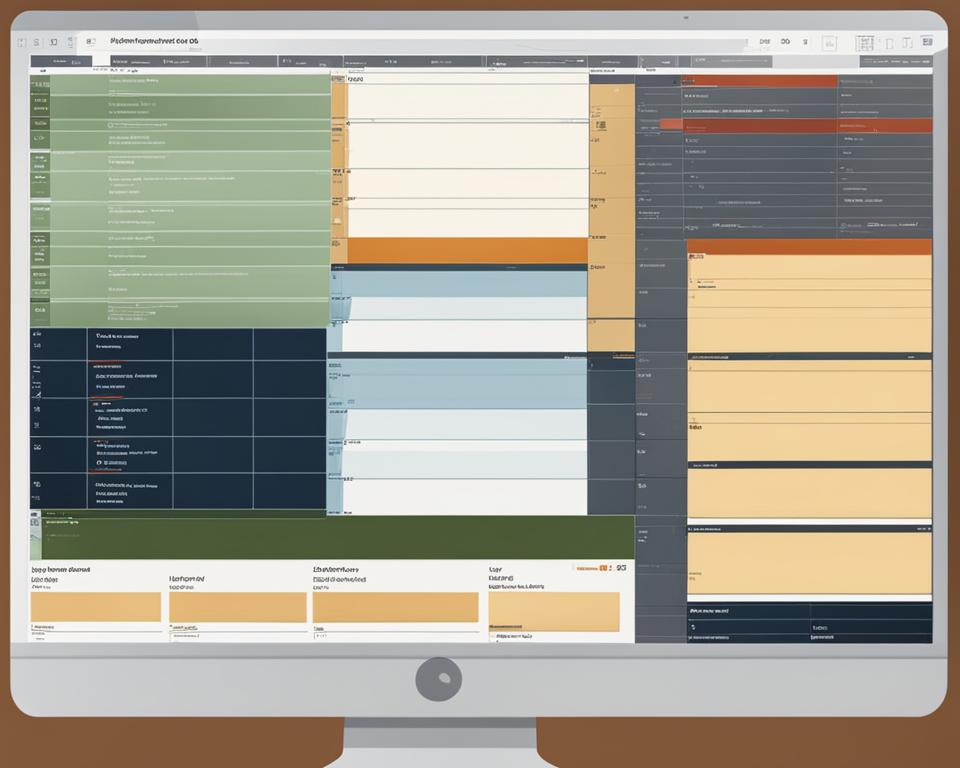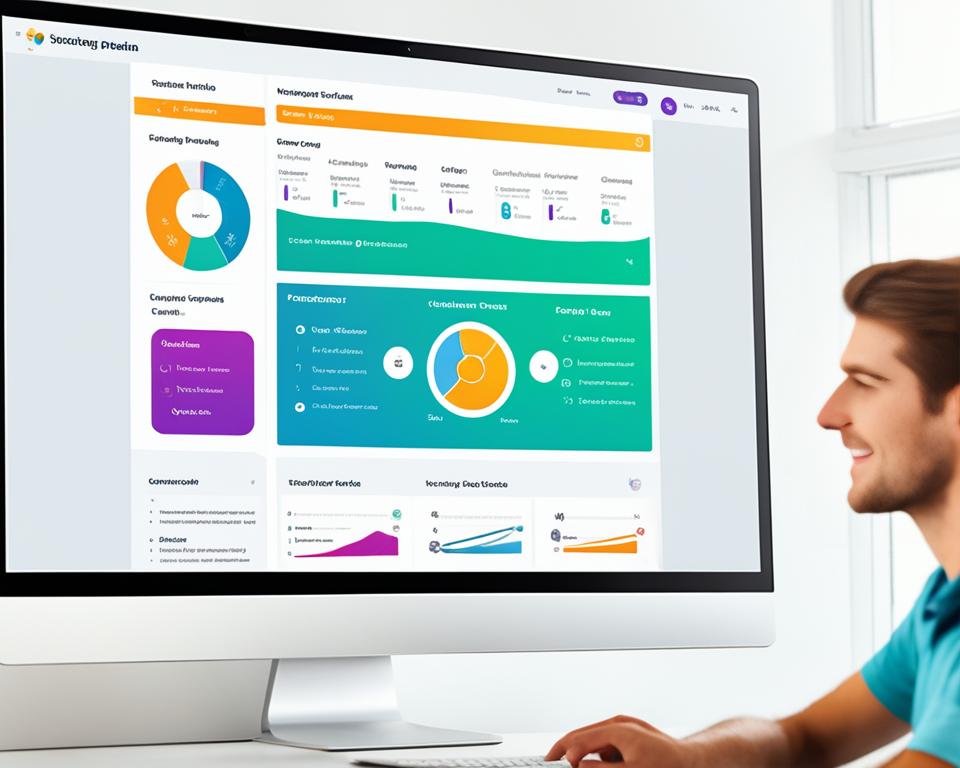Welcome to the world of online learning! Whether you’re a student or a professional looking to expand your knowledge, virtual classes offer the flexibility and convenience of learning from the comfort of your home. With the right strategies and tools, you can make the most of your online education and achieve your learning goals. In this section, we will explore some key tips and techniques to help you succeed in online lessons.
Key Takeaways:
- Online lessons provide the opportunity to learn from home and offer flexibility.
- Maximize your learning by implementing effective time management strategies.
- Develop active reading and study skills to enhance your online learning experience.
- Ensure a smooth online learning experience by managing your technology and internet connection.
- Engage with your classmates and professors to create a learning community.
Manage Your Time and Environment for Successful Online Learning
Effective time management is crucial when learning online. Balancing your studies with other commitments can be challenging, but with the right strategies, you can stay on track and make the most of your virtual education. Here are some tips to help you manage your time and create an optimal learning environment:
Create a Study Schedule
- Set aside dedicated time for studying each day. Treat it as you would a regular class or appointment. Consistency is key for effective time management.
- Break your study sessions into manageable chunks. The pomodoro technique, where you work for 25 minutes and take a short break, can help improve focus and productivity.
Minimize Distractions
- Find a quiet and comfortable space where you can concentrate without interruptions. Clear away clutter and create a clean and organized study area.
- Turn off or mute notifications on your devices to avoid being constantly tempted by social media or other distractions. Focus on your online learning tasks.
Utilize Time Management Tools
Take advantage of time management tools to help you stay organized and accountable:
“Time is what we want most, but what we use worst.” – William Penn
Here are some popular time management tools:
- Planners and calendars: Keep track of assignments, deadlines, and study sessions using an online or physical planner.
- Task management apps: Use apps like Trello, Todoist, or Asana to create to-do lists and prioritize your tasks.
- Time tracking apps: Monitor how you spend your time and identify areas where you can improve your efficiency. Apps like RescueTime or Toggl can be helpful.
By managing your time effectively and creating an environment conducive to learning, you can make the most of your online education. Stay focused, minimize distractions, and utilize time management tools to optimize your virtual learning experience.
Next, let’s explore how you can maximize your learning in an online environment. Section 3: Maximize Your Learning in an Online Environment.
Maximize Your Learning in an Online Environment
Studying in an online environment requires effective study skills. To enhance your learning experience, it’s important to utilize strategies such as active reading, iterative note review, retrieval practice, and spaced practice sessions. Additionally, incorporating metacognition and adopting good online learning practices can further optimize your educational journey.
The Power of Active Reading
Active reading is an essential skill when learning online. By actively engaging with the text, you can improve comprehension, retention, and critical thinking. Here are some techniques to enhance your active reading:
- Preview the material: Skim through the headings, subheadings, and any highlighted or bolded text to get an overview of the content.
- Take notes: Jot down your thoughts, questions, and key points while reading. This helps in summarizing and reinforcing the material later.
- Annotate the text: Underline or highlight important concepts, new vocabulary, or passages that require further exploration. This aids in creating visual cues for better knowledge retention.
- Ask questions: Interact with the text by asking yourself questions about the material, encouraging critical thinking and deeper understanding.
- Summarize and reflect: After reading a section, summarize the main ideas in your own words. Reflect on the relevance of the content to your studies and make connections to previous knowledge.
Remember, active reading is an ongoing process. Continuously engage with the text, review your notes, and revisit difficult concepts to ensure a comprehensive understanding.
Iterative Note Review
Note-taking is a fundamental study skill, and in an online learning environment, it becomes even more crucial. Iterative note review involves regularly revisiting and revising your notes to reinforce learning and prevent forgetting. Here’s how to make the most of iterative note review:
- Consolidate your notes: Organize your notes in a systematic manner, grouping related information together.
- Chunk your notes: Break down complex topics into smaller, manageable chunks. This helps in better understanding and retention.
- Review frequently: Set regular review sessions to revisit your notes. Aim for short, focused sessions spread out over time, as research suggests that spaced repetition enhances long-term memory.
- Actively engage with your notes: Use your notes as a tool to quiz yourself. Cover up key information and try to recall it from memory. This retrieval practice strengthens knowledge retrieval and retention.
- Revise and update: Periodically update your notes with additional information, clarifications, or new insights gained through further study or class discussions.
By implementing iterative note review, you can reinforce your understanding of the material, identify areas that require further attention, and build a solid foundation for future learning.
The Importance of Metacognition and Good Online Learning Practices
Metacognition refers to thinking about one’s own thinking processes. When applied to online learning, metacognition helps you become more aware of your learning strategies, adapt them when necessary, and reflect on your academic progress. Here are some techniques to incorporate metacognition into your online learning practices:
“Metacognition allows me to identify areas where I need to put in extra effort and adjust my study techniques accordingly. It helps me stay focused and motivated throughout my online learning journey.” – Olivia Simmons, Online Learner
- Set goals: Establish clear objectives for your learning. Identify what you want to achieve and how you will measure success.
- Monitor your learning: Regularly assess your understanding of the material. Reflect on what strategies are working for you and what areas need improvement.
- Seek feedback: Actively seek feedback from instructors, peers, or online forums. Embrace constructive criticism as an opportunity for growth.
- Reflect and adjust: Periodically reflect on your progress and make adjustments to your study methods or approaches if needed.
- Stay organized: Maintain a well-structured system for managing your online courses, assignments, and study materials. This keeps you on track and reduces stress.
By cultivating metacognitive awareness and implementing good online learning practices, you can optimize your study efficiency, identify areas for improvement, and achieve higher academic outcomes.
| Strategy | Benefits |
|---|---|
| Active Reading |
|
| Iterative Note Review |
|
| Metacognition and Good Online Learning Practices |
|
By incorporating active reading, iterative note review, metacognitive strategies, and good online learning practices into your study routine, you can maximize your learning potential in an online environment.
Manage Your Technology for Smooth Online Learning
When it comes to online learning, having the right technology is essential to ensure a smooth and productive experience. In this section, we will provide you with information on the basic technological requirements, as well as steps you can take to optimize your digital setup and minimize distractions. By managing your technology effectively, you can create an environment that is conducive to focused and uninterrupted online learning.
Basic Technological Requirements
Before diving into online learning, it’s important to ensure that you have the necessary technology in place. Here are some key requirements:
- A computer or laptop: Choose a device that is reliable, up-to-date, and capable of handling the demands of online learning.
- A reliable internet connection: A stable and fast internet connection is crucial for seamless access to online course materials, video lectures, and virtual classrooms.
- Necessary software: Depending on your courses, you may need specific software or applications. Make sure you have the required software installed and updated on your device.
By meeting these basic technological requirements, you can ensure that you have a solid foundation for engaging in online learning.
Optimizing Your Digital Setup
Once you have the necessary technology in place, there are further steps you can take to enhance your online learning experience:
- Create a dedicated study area: Set up a comfortable and organized space where you can focus solely on your online learning. This will help minimize distractions and promote concentration.
- Ensure a quiet environment: Find a location where you can study without interruptions from noise or other household activities. Consider using noise-cancelling headphones if necessary.
- Organize your files and folders: Keep your course materials, assignments, and notes well-organized on your computer for easy access and retrieval.
- Set up notifications and reminders: Use productivity tools or apps to set reminders for important deadlines, class schedules, and assignments. This will help you stay on top of your coursework and avoid missing any crucial updates.
By following these steps, you can create an optimized digital setup that supports your online learning journey and allows you to stay focused and productive.
Reducing Distractions with Technology
While technology can greatly enhance the online learning experience, it can also be a source of distractions. Here are a few strategies to help you minimize distractions and stay focused:
“Technology provides us with unlimited access to information and resources. However, it’s essential to use it mindfully and set boundaries to avoid getting overwhelmed or distracted.”
- Disable notifications: Temporarily turn off notifications for non-essential apps and websites to avoid interruptions while studying.
- Use website blockers: If you find yourself frequently visiting distracting websites, consider using website blocking tools or browser extensions to limit access during study sessions.
- Implement time management techniques: Use time management strategies like the Pomodoro Technique, which involves working in focused bursts followed by short breaks, to stay disciplined and productive.
By implementing these strategies, you can harness the power of technology while minimizing distractions, allowing you to make the most of your online learning experience.
Using technology effectively can enhance your online learning experience.
Participate in Your Learning Community for Engaging Online Education
Participating in your online learning community is a key component of an engaging and enriching educational experience. By actively engaging with your classmates, professor, and support network, you can foster a sense of belonging and enhance your learning journey.
Actively participating in online classes allows you to contribute to discussions, share your ideas, and gain a deeper understanding of the subject matter. By asking questions and seeking clarification, you can clarify any uncertainties and expand your knowledge.
Collaborating with your peers in virtual classrooms also enables you to gain diverse perspectives and learn from their experiences. Engaging in group projects, online forums, and study groups helps build a strong learning community where ideas can be shared and explored together.
“When you actively participate in your virtual classroom, you not only enhance your own learning but also contribute to the growth and development of your classmates. It’s a collaborative journey that amplifies the educational experience.” – [Professor’s Name]
Connecting with your classmates outside of class time is equally important. By leveraging communication tools like discussion boards, group chats, or virtual meetings, you can collaborate on assignments, share resources, and provide support to one another.
Remember, your online learning community is a valuable resource that can provide encouragement, motivation, and assistance throughout your educational journey. By actively participating and engaging with your peers, you can create a dynamic learning environment that fosters growth and academic success.

Take Advantage of Extra Online Courses for Continuous Learning
Online learning provides a wealth of opportunities for continuous learning. By taking advantage of extra online courses, you can expand your knowledge and develop new skills at your own pace. Whether you want to enhance your professional prospects, explore new interests, or simply satisfy your curiosity, online courses offer flexibility and convenience.
Continuous learning is crucial in today’s fast-paced world. It allows you to stay relevant in your field, adapt to changing industries, and explore new career paths. With online courses, you can access a wide range of subjects and topics, from technical skills to personal development.
Platforms like Coursera, edX, and Skillshare offer a vast selection of online courses that cater to different interests and goals. Whether you want to learn coding, graphic design, data analysis, marketing, or even cooking, you’ll find a course that suits your needs.
Enrolling in additional online courses allows you to:
- Expand your knowledge in specific areas of interest
- Stay updated with the latest industry trends and advancements
- Acquire new skills that can boost your career prospects
- Network with like-minded individuals and experts in the field
- Gain a competitive edge in the job market
Continuous learning is a valuable investment in yourself. It demonstrates your commitment to personal growth and showcases your willingness to adapt to new challenges. By leveraging the power of online courses, you can unlock endless opportunities for skill development and lifelong learning.
Set Realistic Goals for Effective Online Learning
When it comes to online learning, setting realistic goals is key to your success. By establishing clear objectives, you can stay focused and motivated throughout your educational journey. In this section, we will guide you through the process of developing SMART goals that are specific, measurable, achievable, relevant, and time-bound.
What Are SMART Goals?
SMART goals provide a structured framework for goal setting that increases the likelihood of achieving the desired outcomes. Let’s break down each component:
- Specific: Clearly define what you want to accomplish. Avoid vague goals and be specific about what you want to achieve in your online learning journey.
- Measurable: Determine how you will measure your progress and success. This could include tracking completed assignments, quizzes, or grades.
- Achievable: Set goals that are realistic and attainable. Consider your current circumstances, available resources, and the time you can dedicate to your studies.
- Relevant: Ensure your goals align with your overall learning objectives. Make sure they are relevant to your program or the skills you want to acquire.
- Time-Bound: Assign deadlines to your goals to create a sense of urgency and maintain focus. Setting specific timeframes will help you stay on track and avoid procrastination.
Now that you understand the components of SMART goals, let’s explore how to apply them to your online learning experience.
Planning Ahead and Creating a Study Plan
To set realistic goals, it’s important to plan ahead and create a study plan that fits your schedule. Start by reviewing your course syllabus and identifying key assignments, exams, and deadlines. Break down larger tasks into smaller, manageable subtasks. This will help you stay organized and ensure that you are progressing towards your goals.
Seeking Support When Needed
Online learning can sometimes be challenging, but remember that you are not alone. Reach out to your instructor, classmates, or online learning support services if you need assistance. Establish a network of support that can help you overcome obstacles and stay motivated throughout your learning journey.
To summarize, setting realistic goals is crucial for effective online learning. By developing SMART goals, planning ahead, creating a study plan, and seeking support when needed, you can maximize your learning potential and achieve academic success.
Overcome Challenges with Online Learning Tips and Strategies
Online learning may present unique challenges, but with the right tips and strategies, you can overcome them. This section will offer guidance on managing your expectations, being prepared with the right equipment, creating a dedicated study area, seeking support when needed, and reviewing and revising your materials for better understanding.
When participating in online learning, it’s important to set realistic expectations for yourself. Understand that learning online is different from traditional classroom learning, and it may require some adjustments. Stay motivated and persevere through any challenges that come your way.
One of the keys to a successful online learning experience is being prepared with the right equipment. Ensure that you have a reliable computer or laptop and a stable internet connection. Having the necessary tools will allow you to fully engage in your online courses without interruption.
Creating a designated study area can significantly improve your focus and productivity. Set up a quiet and comfortable space where you can concentrate on your coursework. Remove any distractions and have all the materials you need within reach.
“A dedicated study area can help you maintain a focused mindset and separate your learning time from other activities.” – John Smith, Online Learning Expert
Remember, support is always available when you need it. Don’t hesitate to seek help from your instructors, classmates, or online support services. Online learning platforms often offer resources such as discussion boards, chat functions, and virtual office hours to connect with others and get the assistance you need.
Regularly reviewing and revising your materials is essential for deepening your understanding of the content. Take notes during lectures, engage in active reading strategies, and review your coursework regularly. This will help reinforce your learning and ensure that you grasp the concepts effectively.
Online Learning Tips and Strategies:
- Set realistic expectations and stay motivated.
- Be prepared with the right equipment and a stable internet connection.
- Create a dedicated study area free from distractions.
- Seek support from instructors, classmates, and online resources.
- Regularly review and revise your materials for better understanding.
By implementing these tips and strategies, you’ll be able to navigate through the challenges of online learning and make the most of your educational journey.
Embrace the Fun and Benefits of Online Learning
Online learning opens up a world of possibilities, offering a fun and rewarding experience that can lead to personal growth and improved brain function. With its flexibility and myriad opportunities, online learning allows you to embark on a journey of acquiring new knowledge and skills. Embrace the learning process and create a positive learning environment to make the most of this transformative experience.
The Benefits of Learning Online
Learning online comes with numerous advantages that make it an appealing option for personal and academic growth. Here are some key benefits:
- Flexibility: Online learning gives you the freedom to learn at your own pace and set your own schedule. You can study whenever and wherever is most convenient for you, fitting your education around your other commitments.
- Personal Growth: Engaging in online learning allows you to explore new subjects and develop a diverse range of skills. It promotes self-discipline, resilience, and independence, fostering personal growth and enhancing your capabilities.
- Improved Brain Function: Research has shown that learning stimulates brain activity, promoting cognitive health and enhancing memory retention. Online learning provides ample opportunities for brain exercise, helping you maintain mental agility and sharpen your intellectual abilities.
The benefits of online learning extend far beyond the virtual classroom. By embracing this educational approach, you empower yourself to shape your own learning journey and discover new passions and strengths.
Remember, learning should be a joyful experience. It’s not just about acquiring knowledge; it’s about exploring new horizons, challenging yourself, and finding fulfillment in your personal and academic pursuits. So, let’s dive in and embark on this exciting adventure of online learning together!
“The future of education is about embracing the advantages of online learning and tapping into the limitless possibilities it offers.”
Conclusion
Congratulations! You now have the tools and strategies to maximize your learning potential with online lessons. By effectively managing your time and environment, actively participating in classes, and connecting with your classmates, you can create a conducive learning experience.
Additionally, taking advantage of extra online courses will further enhance your knowledge and skill development. By setting realistic goals, overcoming challenges, and embracing the fun of online learning, you can continue to grow personally and academically.
Remember, online learning offers flexibility and the opportunity for personal growth. So, keep striving to achieve your goals and make the most of this unique learning experience. With dedication and determination, you can unlock your full potential and succeed in your online education journey.
FAQ
What are the benefits of online lessons?
Online lessons offer flexibility, convenience, and the ability to learn from anywhere. You can access a wide range of courses and resources, connect with expert instructors, and learn at your own pace.
How can I manage my time effectively for online learning?
To manage your time effectively, create a study schedule, set goals, and prioritize tasks. Minimize distractions, use time management techniques like the pomodoro method, and establish a dedicated study space.
How can I maximize my learning in an online environment?
Maximize your learning by using active reading strategies, practicing iterative note review, engaging in retrieval practice, and spacing out your study sessions. Practice metacognition and adopt good online learning practices to enhance your learning experience.
What technology do I need for online learning?
You will need a computer or laptop, a reliable internet connection, and necessary software for online learning. Make sure your digital setup is optimized and minimize distractions caused by technology.
How can I participate in my online learning community?
Actively participate in online classes by asking questions, joining discussions, and collaborating with your peers. Connect with your classmates, professor, and support network to foster a sense of community and enhance your educational experience.
Where can I find extra online courses to expand my knowledge?
There are many platforms that offer online courses, such as Coursera, edX, and Skillshare. These platforms provide a wide range of courses in various subjects that can help you acquire new skills and further enhance your knowledge.
How can I set realistic goals for effective online learning?
Set SMART goals (specific, measurable, achievable, relevant, and time-bound) for your online learning. Plan ahead, create a study plan, and seek support when needed to stay on track and achieve your learning objectives.
How can I overcome challenges with online learning?
Manage your expectations, ensure you have the right equipment and study area, seek help when needed, and review and revise your materials for better understanding. Stay motivated and resilient in the face of challenges to succeed in online learning.
What are the benefits of online learning?
Online learning offers flexibility, personal growth, and improved brain function. It allows you to learn at your own pace, explore diverse subjects, and acquire new skills while enjoying the journey of acquiring knowledge.
How can I maximize my learning potential with online lessons?
To maximize your learning potential, manage your time and environment, actively participate in classes, connect with your classmates, take advantage of extra courses, set realistic goals, overcome challenges, and embrace the fun of online learning.





